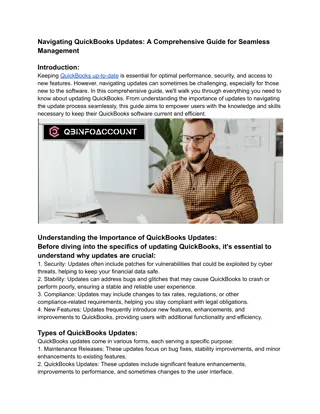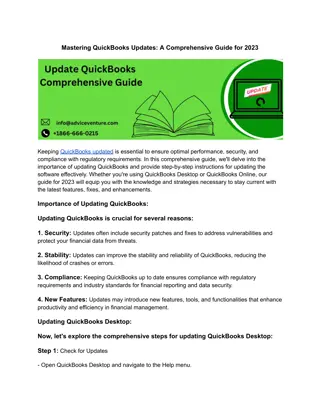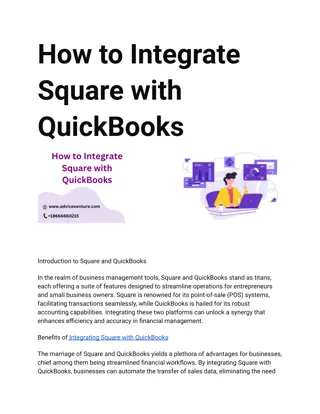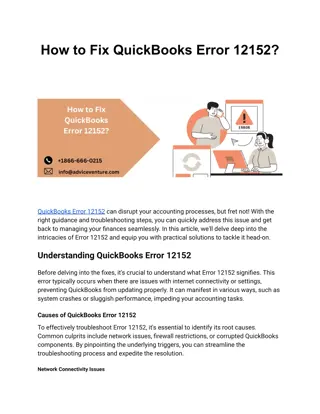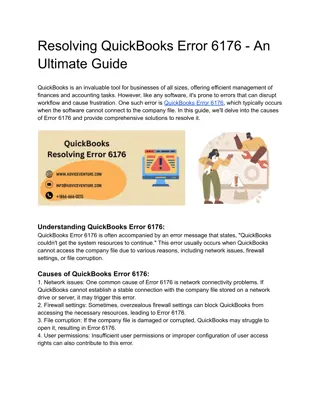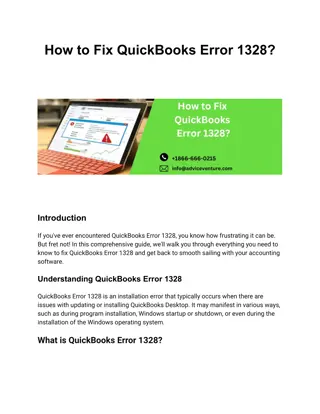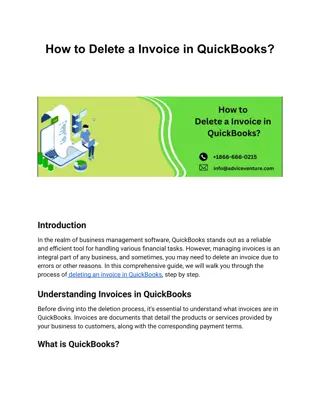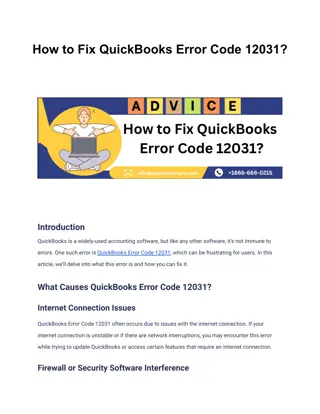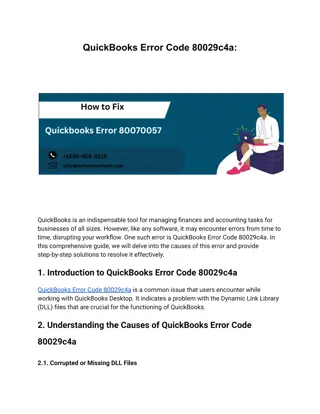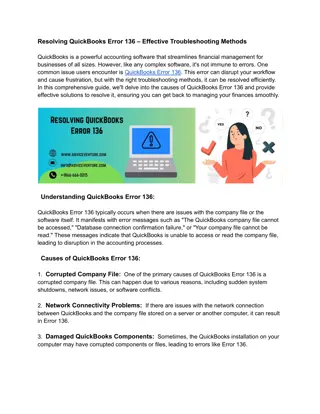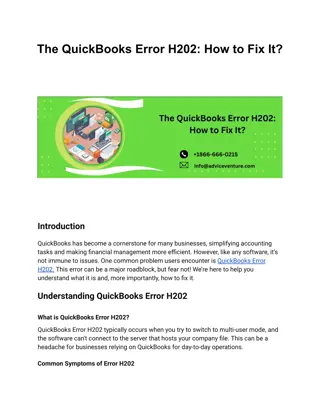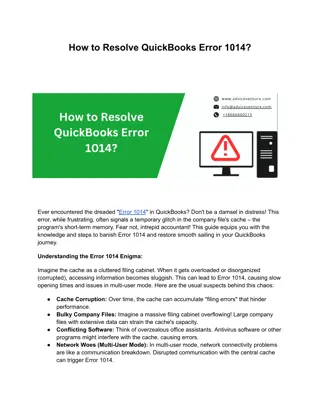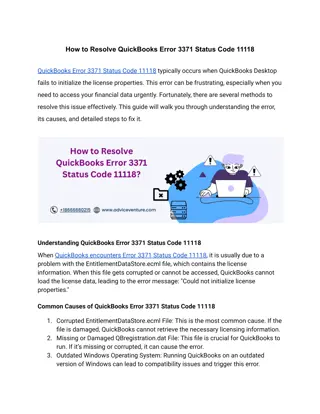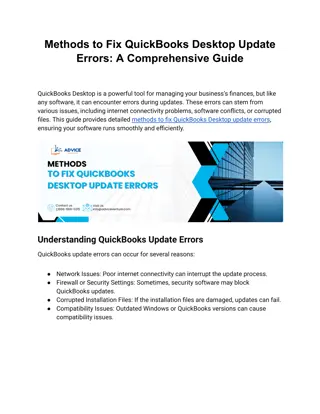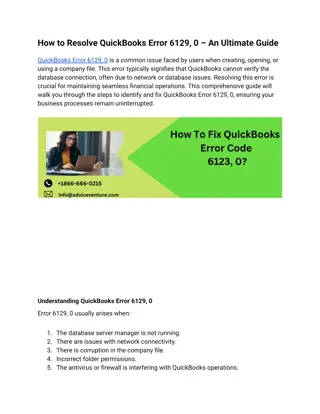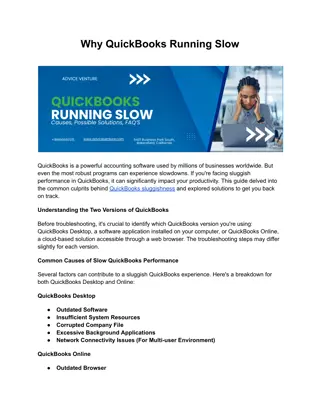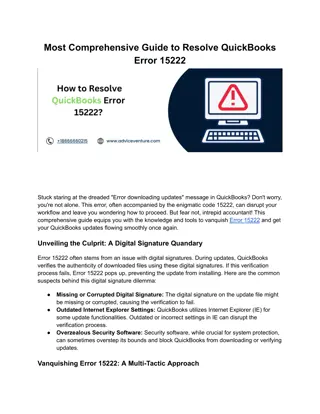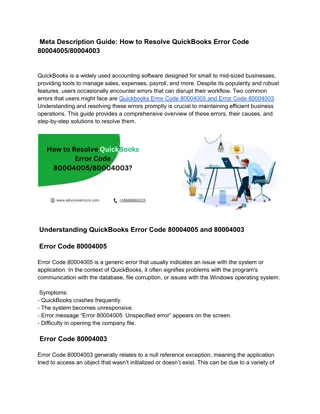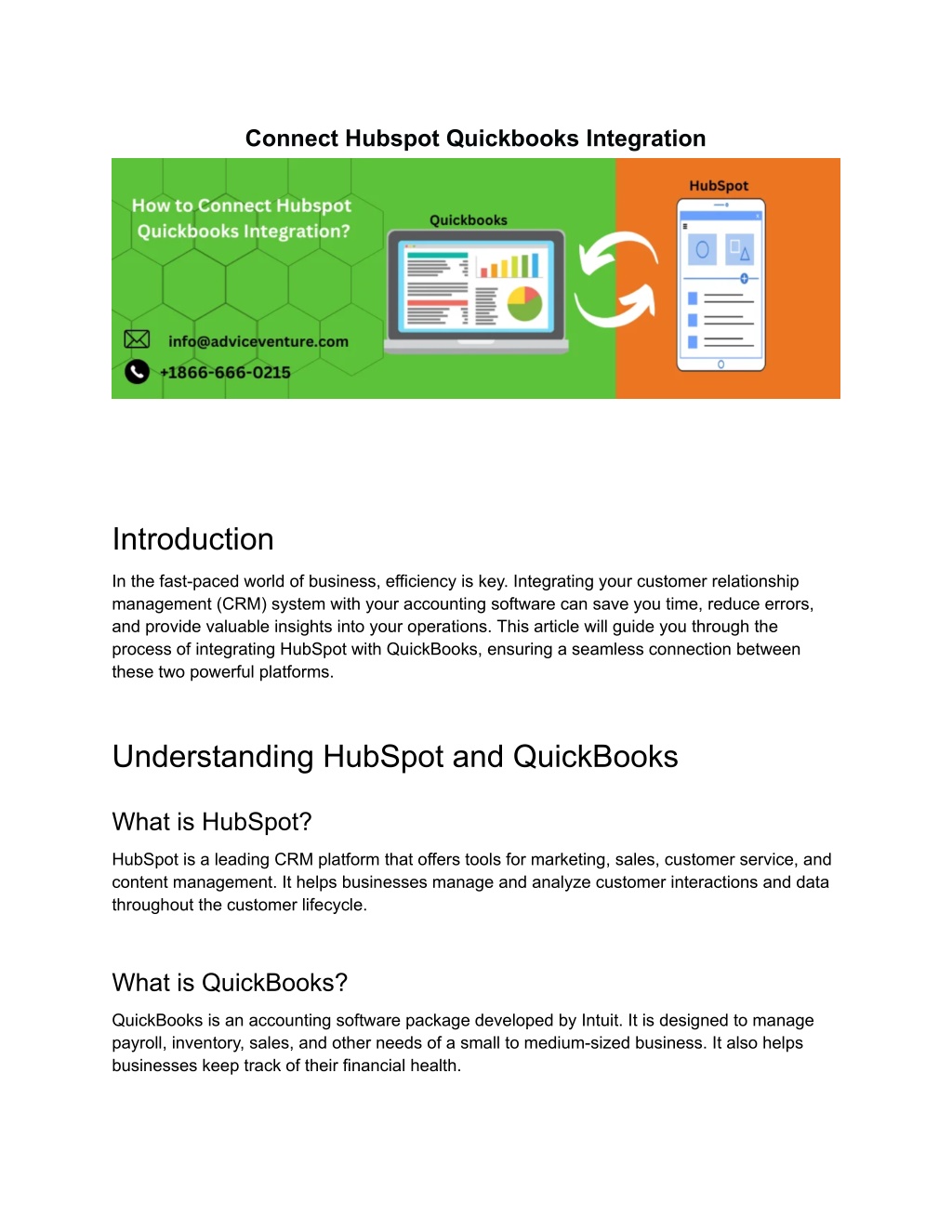
Connect Hubspot Quickbooks Integration
Connect Hubspot Quickbooks IntegrationnIntegrating HubSpot with QuickBooks streamlines your business operations by automating data sync between your CRM and accounting software. This integration enhances data accuracy, improves customer insights, and simplifies financial processes. You can achieve integration through direct connections, third-party tools like Zapier, or custom solutions. Ensure your data is clean, backed up, and both platforms are updated. Regularly monitor syncs and train your team for optimal use. Secure sensitive data and comply with regulations to safeguard your integratio
Download Presentation

Please find below an Image/Link to download the presentation.
The content on the website is provided AS IS for your information and personal use only. It may not be sold, licensed, or shared on other websites without obtaining consent from the author. If you encounter any issues during the download, it is possible that the publisher has removed the file from their server.
You are allowed to download the files provided on this website for personal or commercial use, subject to the condition that they are used lawfully. All files are the property of their respective owners.
The content on the website is provided AS IS for your information and personal use only. It may not be sold, licensed, or shared on other websites without obtaining consent from the author.
E N D
Presentation Transcript
Connect Hubspot Quickbooks Integration Introduction In the fast-paced world of business, efficiency is key. Integrating your customer relationship management (CRM) system with your accounting software can save you time, reduce errors, and provide valuable insights into your operations. This article will guide you through the process of integrating HubSpot with QuickBooks, ensuring a seamless connection between these two powerful platforms. Understanding HubSpot and QuickBooks What is HubSpot? HubSpot is a leading CRM platform that offers tools for marketing, sales, customer service, and content management. It helps businesses manage and analyze customer interactions and data throughout the customer lifecycle. What is QuickBooks? QuickBooks is an accounting software package developed by Intuit. It is designed to manage payroll, inventory, sales, and other needs of a small to medium-sized business. It also helps businesses keep track of their financial health.
Why use these platforms? Both HubSpot and QuickBooks are widely recognized for their user-friendly interfaces, comprehensive features, and ability to scale with your business. Integrating these two platforms allows you to unify your customer data and financial information, leading to more informed decision-making and streamlined operations. Benefits of Integrating HubSpot with QuickBooks Streamlined Operations By integrating HubSpot with QuickBooks, you can automate data entry tasks, reducing the time spent on manual data transfer and minimizing the risk of errors. Improved Data Accuracy Automatic synchronization between HubSpot and QuickBooks ensures that your data is always up-to-date, reducing discrepancies and improving the accuracy of your records. Enhanced Customer Insights Combining CRM data with financial data provides a more comprehensive view of your customers, allowing you to better understand their purchasing behavior and preferences. Simplified Financial Processes Integration simplifies your financial processes by ensuring that invoices, payments, and other financial data are automatically updated, making it easier to manage your accounts and track your financial health. Preparation Before Integration Assess Your Business Needs Before starting the integration process, assess your business needs and determine the specific data and functionalities you need to sync between HubSpot and QuickBooks.
Ensure Data Readiness Ensure that your data in both HubSpot and QuickBooks is clean, accurate, and up-to-date. This will help prevent issues during the integration process. Backup Your Data Always backup your data before making any major changes to your systems. This ensures that you can restore your data if something goes wrong during the integration process. Methods of Integration Direct Integration HubSpot and QuickBooks offer direct integration options that allow for a seamless connection between the two platforms. Third-Party Integration Tools There are several third-party tools available that can facilitate the integration between HubSpot and QuickBooks, offering additional features and customization options. Custom Integration Solutions For businesses with specific needs, custom integration solutions can be developed by working with developers to create a tailored connection between HubSpot and QuickBooks. Step-by-Step Guide to Direct Integration Accessing the Integration Marketplace Start by accessing the HubSpot App Marketplace or the QuickBooks App Store to find the integration options available for connecting the two platforms.
Setting Up the HubSpot-QuickBooks Connection Follow the prompts to set up the connection between HubSpot and QuickBooks. This typically involves authorizing both platforms to access each other's data. Configuring Settings and Preferences Once the connection is established, configure the settings and preferences to ensure that the data sync aligns with your business needs. Syncing Data Between HubSpot and QuickBooks Initiate the data sync process to start transferring data between HubSpot and QuickBooks. Monitor the sync to ensure that it is working correctly and that all data is being transferred accurately. Using Third-Party Integration Tools Overview of Popular Tools Popular third-party tools for integrating HubSpot and QuickBooks include Zapier, PieSync, and Automate.io. These tools offer additional features and customization options that may not be available through direct integration. Step-by-Step Setup Using a Third-Party Tool Choose a third-party tool that meets your needs. Create accounts and link HubSpot and QuickBooks to the tool. Set up the integration by defining the data flow and sync rules. Test the integration to ensure it works as expected. Pros and Cons of Using Third-Party Tools Pros: Additional customization options Enhanced features and functionalities Flexibility to connect other tools and platforms
Cons: Potential additional costs Dependency on third-party services Possible complexity in setup and maintenance Custom Integration Solutions When to Consider Custom Integration Consider custom integration if your business has unique needs that cannot be met by direct or third-party integration options. Custom solutions offer the flexibility to tailor the integration to your specific requirements. Working with Developers Collaborate with developers to design and implement a custom integration solution. Ensure that the developers understand your business processes and integration goals. Maintenance and Support Custom integrations require ongoing maintenance and support to ensure that they continue to function correctly as your business evolves and as software updates are released. Common Issues and Troubleshooting Syncing Errors Syncing errors can occur due to various reasons such as connectivity issues, data format discrepancies, or software bugs. Regularly monitor the sync process and address any errors promptly. Data Discrepancies Data discrepancies can arise if the data in HubSpot and QuickBooks is not aligned. Regular audits and data reconciliation can help identify and resolve these issues.
Connectivity Problems Ensure that both HubSpot and QuickBooks are connected to the internet and that there are no firewall or network issues blocking the integration. Best Practices for Successful Integration Regularly Update Software Keep both HubSpot and QuickBooks updated to the latest versions to ensure compatibility and access to new features and improvements. Monitor Data Syncs Regularly monitor the data syncs to ensure that they are functioning correctly and that there are no issues affecting the integration. Train Your Team Provide training to your team on how to use the integrated system effectively. Ensure that they understand the benefits of the integration and how to troubleshoot common issues. Security Considerations Protecting Sensitive Data Ensure that sensitive customer and financial data is protected during the integration process. Use encryption and other security measures to safeguard your data. Compliance with Regulations Ensure that your integration complies with relevant data protection and privacy regulations such as GDPR or CCPA. Consult with legal experts if necessary. Secure Access Controls Implement secure access controls to restrict access to sensitive data and integration settings to authorized personnel only.
Real-World Examples and Case Studies Tips for Maximizing the Benefits Leveraging Analytics Use the combined data from HubSpot and QuickBooks to gain deeper insights into your business performance and customer behavior. Automating Workflows Automate repetitive tasks and workflows to save time and improve efficiency. This can include automating invoicing, follow-ups, and reporting. Enhancing Customer Engagement Use the integrated data to personalize your marketing and sales efforts, leading to better customer engagement and satisfaction. Future Trends in CRM and Accounting Integration AI and Machine Learning Artificial intelligence and machine learning are increasingly being used to enhance CRM and accounting integrations, providing predictive analytics and automating complex tasks. Predictive Analytics Predictive analytics can help businesses forecast sales, manage inventory, and make informed financial decisions based on historical data and trends. Enhanced Automation Future integrations will likely feature enhanced automation capabilities, reducing the need for manual intervention and further streamlining business processes. Conclusion Integrating HubSpot with QuickBooks can transform your business operations, providing a seamless flow of data between your CRM and accounting systems. By following the steps outlined in this guide, you can achieve a successful integration and unlock the full potential of these powerful tools. Start your integration journey today and experience the benefits of a unified business system.
FAQs How long does the integration process take? The integration process can vary depending on the complexity of your setup and the method you choose. Direct integrations typically take a few hours to a day, while custom integrations may take several weeks. Can I integrate other tools with HubSpot and QuickBooks? Yes, both HubSpot and QuickBooks support integrations with a wide range of other tools and platforms, allowing you to create a comprehensive business ecosystem. What if I encounter data sync issues? If you encounter data sync issues, check your integration settings, ensure that your software is up-to-date, and consult the support resources provided by HubSpot, QuickBooks, or the third-party tool you are using. Is there customer support available for integration issues? Yes, both HubSpot and QuickBooks offer customer support to assist with integration issues. Additionally, third-party integration tools often provide their own support services. Can I customize the integration according to my business needs? Yes, you can customize the integration to match your specific business needs, especially if you opt for custom integration solutions. Work with developers to tailor the integration to your requirements. https://www.adviceventure.com/quickbooks-already-has-a-company-file-open-error/ https://www.adviceventure.com/ Email: info@adviceventure.com Call [Toll Free]: +18666660215

